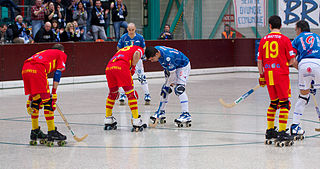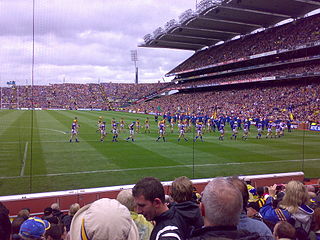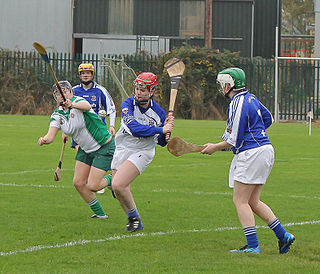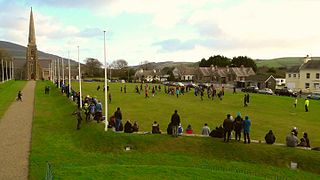Related Research Articles

Bandy is a winter sport and ball sport played by two teams wearing ice skates on a large ice surface while using sticks to direct a ball into the opposing team's goal. The international governing body for bandy is the Federation of International Bandy (FIB). Internationally, bandy's strongest nations in both men's and women's competition at present are Sweden and Russia.

Hockey is a term used to denote various types of both summer and winter team sports which originated on either an outdoor field, sheet of ice, or dry floor such as in a gymnasium.

Ice hockey is a contact winter team sport played on ice skates, usually on an ice skating rink with lines and markings specific to the sport. In ice hockey, two opposing teams use ice hockey sticks to control, advance and shoot a closed, vulcanized, rubber disc called a "puck" into the other team's goal. Each goal is worth one point. The team which scores the most goals is declared the winner. In a formal game, each team has six skaters on the ice at a time, barring any penalties, one of whom is the goaltender.

Hurling is an outdoor team game of ancient Gaelic Irish origin, played by men. One of Ireland's native Gaelic games, it shares a number of features with Gaelic football, such as the field and goals, the number of players and much terminology. There is a very similar game for women called camogie, which shares a common Gaelic root.

Shinty is a team game played with sticks and a ball. Shinty is now played mainly in the Scottish Highlands and amongst Highland migrants to the big cities of Scotland, but it was formerly more widespread in Scotland, and was even played in northern England into the second half of the 20th century and other areas in the world where Scottish Highlanders migrated.

Camogie is an Irish stick-and-ball team sport played by women. Camogie is played by 100,000 women in Ireland and worldwide, largely among Irish communities.

Sport in the United Kingdom plays an important role in British culture. The United Kingdom has given birth to a large majority of the team sports including association football, badminton, billiards, bowls, boxing, British baseball, rounders, cricket, croquet, curling, darts, golf, fives, field hockey, netball, rugby, tennis, table tennis, snooker, Motorcycle Speedway, squash, water polo, and shinty. Moreover, the standardisation of various sports, such as in rowing, dancesports and motorsports occurred in the United Kingdom.

Lybster is a village on the east coast of Caithness in northern Scotland. It was once a big herring fishing port.

Sport plays a central role in Scottish culture. The temperate, oceanic climate has played a key part in the evolution of sport in Scotland, with all-weather sports like association football and golf dominating the national sporting consciousness. However, many other sports are played in the country, with popularity varying between sports and between regions.
Thomas Walsh is an Irish hurler who played as a right wing-back for the Kilkenny senior team.

Cammag is a team sport originating on the Isle of Man. It is closely related to the Scottish game of shinty and is similar to the Irish game of hurling. Once the most widespread sport on Man, it ceased to be played around 1900 after the introduction of association football, though it has experienced a revival in the 21st century.

The Wick and Lybster Light Railway was a light railway opened in 1903, with the intention of opening up the fishing port of Lybster, in Caithness, Scotland, to the railway network at Wick. Its construction was heavily supported financially by local government and the Treasury. It was worked by the Highland Railway.

The history of hurling is long and often unclear, stretching back over three millennia. References to stick-and-ball games are found in Irish mythology. The game is thought to be related to the games of shinty that is played primarily in Scotland, cammag on the Isle of Man and bandy that was played formerly in England and Wales. There is evidence that in ancient times it was also played in Iceland, old sagas "suggesting that it was something that was brought from the Gælic area to Iceland".
Composite rules shinty–hurling —sometimes known simply as shinty–hurling—is a hybrid sport which was developed to facilitate international matches between shinty players and hurling players.
Naver Athletic Camanachd Club was a shinty club based in Bettyhill, Sutherland, Scotland established in 2008. It was a select team drawing players from both Sutherland and Caithness. Naver competed in the Strathdearn and Sutherland Cups in 2008.
The Cornwall Shinty Club is a shinty club from Cornwall in the UK. Formed in 2012, it is one of few clubs outside the Scottish Highlands.
The English Shinty Association (ESA) is the main body for promoting and encouraging the sport of shinty in England.

Ice hockey is the most popular indoor sport in Scotland, with a fairly established presence in each of the population centres and a spectator attendance lower only than football and rugby union. The term "hockey" is usually reserved for field hockey in Scotland, and "ice hockey" is normally referred to by its full form.

Caithness Shinty Club is a shinty team from Caithness, Scotland. They are the most northerly club in Scotland, based primarily in Thurso but pulling players from across the county.
The Shinty-Hurling International Series is a sports competition played annually between the Ireland national hurling team and Scotland national shinty team. The series is conducted according to the rules of Shinty/Hurling, which is a hybrid sport consisting of a mixture of rules from the Scottish sport of Shinty and the Irish sport of Hurling.